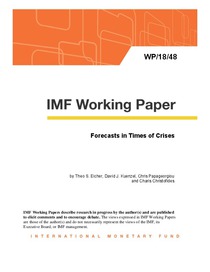Forecasts in times of crises
"Financial crises pose unique challenges for forecast accuracy. Using the IMF’s Monitoring of Fund Arrangement (MONA) database, we conduct the most comprehensive evaluation of IMF forecasts to date for countries in times of crises. We examine 29 macroeconomic variables in terms of bias, efficie...
| Main Authors: | , , , |
|---|---|
| Institution: | ETUI-European Trade Union Institute |
| Format: | TEXT |
| Language: | English |
| Published: |
Washington, DC
2018
IMF |
| Subjects: | |
| Online Access: | https://www.labourline.org/KENTIKA-19301645124911298279-Forecasts-in-times-of-crises.htm |
| _version_ | 1771659897998409728 |
|---|---|
| author | Eicher, Theo S. Kuenzel, David J. Papageorgiou, Chris Christofides, Charis |
| author_facet | Eicher, Theo S. Kuenzel, David J. Papageorgiou, Chris Christofides, Charis |
| collection | Library items |
| description | "Financial crises pose unique challenges for forecast accuracy. Using the IMF’s Monitoring of Fund Arrangement (MONA) database, we conduct the most comprehensive evaluation of IMF forecasts to date for countries in times of crises. We examine 29 macroeconomic variables in terms of bias, efficiency, and information content to find that IMF forecasts add substantial informational value as they consistently outperform naive forecast approaches. However, we also document that there is room for improvement: two thirds of the key macroeconomic variables that we examine are forecast inefficiently and 6 variables (growth of nominal GDP, public investment, private investment, the current account, net transfers, and government expenditures) exhibit significant forecast bias. Forecasts for low-income countries are the main drivers of forecast bias and inefficiency, reflecting perhaps larger shocks and lower data quality. When we decompose the forecast errors into their sources, we find that forecast errors for private consumption growth are the key contributor to GDP growth forecast errors. Similarly, forecast errors for non-interest expenditure growth and tax revenue growth are crucial determinants of the forecast errors in the growth of fiscal budgets. Forecast errors for balance of payments growth are significantly influenced by forecast errors in goods import growth. The results highlight which macroeconomic aggregates require further attention in future forecast models for countries in crises." |
| format | TEXT |
| id | 19301645124911298279_fde52e8c58464145aa483339eb14998c |
| institution | ETUI-European Trade Union Institute |
| is_hierarchy_id | 19301645124911298279_fde52e8c58464145aa483339eb14998c |
| is_hierarchy_title | Forecasts in times of crises |
| language | English |
| physical | 33 p. Digital |
| publishDate | 2018 |
| publisher | Washington, DC IMF |
| spellingShingle | Eicher, Theo S. Kuenzel, David J. Papageorgiou, Chris Christofides, Charis economic forecast economic recession growth rate macroeconomics Forecasts in times of crises |
| thumbnail | https://www.labourline.org/Image_prev.jpg?Archive=135922495310 |
| title | Forecasts in times of crises |
| topic | economic forecast economic recession growth rate macroeconomics |
| url | https://www.labourline.org/KENTIKA-19301645124911298279-Forecasts-in-times-of-crises.htm |

